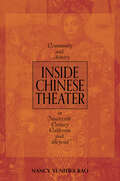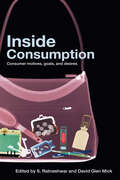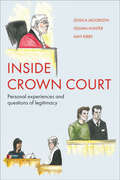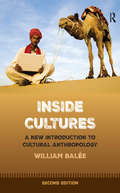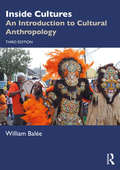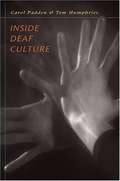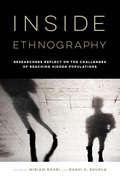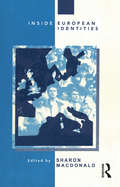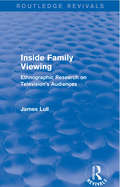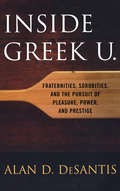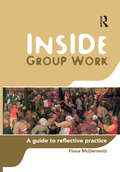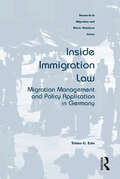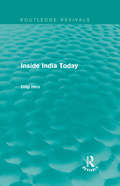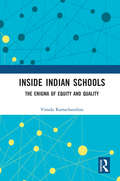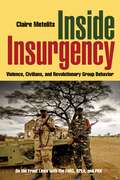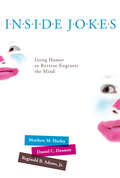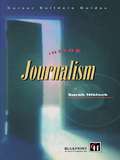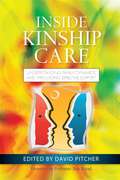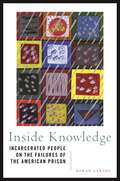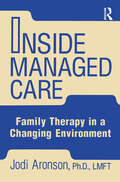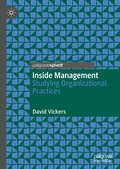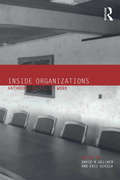- Table View
- List View
Inside Chinese Theater: Community and Artistry in Nineteenth-Century California and Beyond (Music in American Life)
by Nancy Yunhwa RaoIn the mid-nineteenth century, Chinese opera theater arrived as one of the significant performing art forms in California. Nancy Yunhwa Rao excavates and contextualizes the important history of Chinese Opera Theater, bringing to light the ways it became woven into the financial, political, social, and family life in California and beyond. Chinese opera theater found brick-and-mortar homes with San Francisco theaters like the Hing Chuen Yuen and the Donn Qui Yuen. But troupes had already followed Chinese immigrants to mining and railroad towns, and across the American West. As Chinese theater became part of California and San Francisco culture, popular Chinese actors advocated for their art alongside appeals for civil rights. Rao draws on personal diaries, newspapers and artifacts to place Chinese theater within the everyday lives of San Francisco. She also examines the costumes, singing, staging, and storytelling that impacted mainstream reception and influenced how Chinese communities saw themselves. Illustrated with seventy photographs, Inside Chinese Theater is an expert and eloquent journey into the early decades of Chinese opera in America.
Inside Consumption: Consumer Motives, Goals, and Desires
by David Glen Mick S. RatneshwarFollowing on from The Why of Consumption, this book examines motivational factors in diverse consumption behaviours. In a world where consumption has become the defining phenomenon of human life and society, it addresses the effects of critical life events on consumption motives, and the sociological and intergenerational influences on consumer motives and preferences. Its cross-disciplinary approach brings together some of the leading scholars from diverse subject areas to examine the central question about consumption: ‘why?’. This is a unique and invaluable contribution to the area, and an essential asset for all those involved in researching, teaching or studying consumption and consumer behaviour.
Inside Crown Court: Personal Experiences and Questions of Legitimacy
by Jessica Jacobson Gillian HunterWith a new Foreword by David Ormerod of the Law Commission. Within the criminal justice system of England and Wales, the Crown Court is the arena in which serious criminal offences are prosecuted and sentenced. On the basis of up-to-date ethnographic research, this timely book provides a vivid description of what it is like to attend court as a victim, a witness or a defendant; the interplay between the different players in the courtroom; and the extent to which the court process is viewed as legitimate by those involved in it. This valuable addition to the field brings to life the range of issues involved and is aimed at students and scholars of criminal justice, policy-makers and practitioners, and interested members of the general public.
Inside Cultures: A New Introduction to Cultural Anthropology
by William BaleeThis concise, contemporary, and inexpensive option for instructors of cultural anthropology breaks away from the traditional structure of introductory textbooks. Emphasizing the interaction between humans and their environment, the tension between human universals and cultural variation, and the impacts of colonialism on traditional cultures, Inside Cultures shows students how cultural anthropology can help us understand the complex, globalized world around us. This second edition: includes brand new material on a variety of subjects, including genomic studies, race and racism, cross-cultural issues of gender identity, terrorism and ethnography, and business anthropology; presents updated and enhanced discussions of medical anthropology, European colonialism and disease, the Atlantic slave trade, and much more; offers personal stories of the author’s fieldwork in Amazonia, sidebars illustrating fascinating cases of cultures in action, and other pedagogical elements such as timelines; is written is clear, supple prose that delights readers while informing them
Inside Cultures: An Introduction to Cultural Anthropology
by William BaléeThis concise, contemporary option for instructors of cultural anthropology breaks away from the traditional structure of introductory textbooks. Emphasizing the interaction between humans and their environment, the tension between human universals and cultural variation, and the impacts of colonialism on traditional cultures, Inside Cultures shows students how cultural anthropology can help us understand the complex, globalized world around us. This third edition: contains brand new material on many subjects, including anthropological approaches to anti-racism social movements in the Global North during 2020; includes findings in anthropological research regarding the Covid-19 pandemic, and its relation to other recent global events and conditions; updates the organization and presentation of cultural universals and cultural variations; presents updated and enhanced discussions of anthropological studies of humankind and the environment, with expanded analysis of industrial agriculture in the age of globalization; includes more illustrations and updates to existing illustrations, sidebars, and guideposts throughout the volume; is written in clear, supple prose that delights readers while informing on content of one of the important courses in a liberal arts education, one that effectively bridges humanities and the sciences.
Inside Deaf Culture
by Tom Humphries Carol Padden<P>In this [account] of the changing life of a community, the authors of Deaf in America reveal historical events and forces that have shaped the ways that Deaf people define themselves today. Inside Deaf Culture relates Deaf people's search for a voice of their own, and their proud self-discovery and self description as a flourishing culture. <P>Padden and Humphries show how the nineteenth-century schools for the deaf, with their denigration of sign language and their insistence on oralist teaching, shaped the lives of Deaf people for generations to come. They describe how Deaf culture and art thrived in mid-twentieth-century Deaf clubs and Deaf theater, and they profile controversial contemporary technologies. <P> Most triumphant is the story of the survival of the rich and complex American Sign Language long misunderstood but finally recognized by a hearing world that could not conceive of language in a form other than speech. In a moving conclusion, the authors describe their own very different pathways into the Deaf culture, and reveal the confidence and the anxiety of the people of this tenuous community as it faces the future.
Inside Ethnography: Researchers Reflect on the Challenges of Reaching Hidden Populations
by Miriam Boeri Rashi K. ShuklaWhile some books present “ideal” ethnographic field methods, Inside Ethnography shares the realities of fieldwork in action. With a focus on strategies employed with populations at society’s margins, twenty-one contemporary ethnographers examine their cutting-edge work with honesty and introspection, drawing readers into the field to reveal the challenges they have faced. Representing disciplinary approaches from criminology, sociology, anthropology, public health, business, and social work, and designed explicitly for courses on ethnographic and qualitative methods, crime, deviance, drugs, and urban sociology, the authors portray an evolving methodology that adapts to the conditions of the field while tackling emerging controversies with perceptive sensitivity. Their judicious advice on how to avoid pitfalls and remedy missteps provides unusual insights for practitioners, academics, and undergraduate and graduate students.
Inside European Identities: Ethnography in Western Europe (Ethnic Identity Ser.)
by Sharon MacdonaldFollowing recent events in Eastern Europe, questions surrounding European identity seem more pressing than ever. This volume explores, through a series of ethnographic case studies, the construction and experience of identities in Western Europe. All of the case studies are based on fieldwork, and in geographical scope range from Wales to the Basque country; from Corsica to the Lake District. The peoples they look at are similarly diverse: nationalists and members of the Communist party; rural and urban populations. The essays illustrate the ways in which detailed ethnographic case studies can illuminate how identities are lived by ordinary people.
Inside Family Viewing: Ethnographic Research on Television's Audiences (Routledge Revivals)
by James LullFirst published in 1990, this title presents a rich account of how television intersects with family life in American and other world cultures. From an analysis of the political and cultural significance of China’s most important television series to detailed descriptions of how families in the United States interpret and use television at home, James Lull’s ethnographic work marks an important stage in the study of the role of the mass media in contemporary culture. This title will be of interest not only to those in media and communications, but also to those in the broader fields of cultural anthropology and sociology.
Inside Greek U.: Fraternities, Sororities, and the Pursuit of Pleasure, Power, and Prestige
by Alan D. DeSantisThis study examines the potentially damaging influence of fraternities and sororities—and how a new approach could transform Greek life.Popular films such as Revenge of the Nerds and Old School portray college Greek organizations as a training ground for malevolent young aristocrats, yet they fail to depict the enduring influence of these organizations. Inside Greek U. provides an in-depth analysis of how fraternities and sororities bolster damaging definitions of gender and sexuality, negatively impacting the lives of their members.Using evidence gathered in hundreds of focus groups and personal interviews, as well as his years of experience as a faculty advisor to Greek organizations, Alan D. DeSantis examines the limited gender roles available to Greeks: “real men” are unemotional, sexually promiscuous, and violent; “nice girls,” are nurturing, domestic, and pure. These rigid formulations often lead to destructive attitudes and behaviors, such as eating disorders, date rape, sexual misconduct, and homophobia. They also impede students' intellectual and emotional development long after graduation.While many students choose Greek life in search of positive social engagement, the current culture can be profoundly damaging. Inside Greek U. demonstrates how, with a new approach, fraternities and sororities could serve as an enriching influence on individuals and campus life.
Inside Group Work: A guide to reflective practice
by Fiona McDermottA valuable guide to working with groups for a variety of purposes in the human services. Its distinctive strength is the focus on 'thinking group' and on theory informed reflective practice. Grounded throughout in the rich experiences of 'group insiders', the book is both engaging and informative. Definitely a recommended resource for practitioners, students and educators.Ros Thorpe, Professor of Social Work and Community Welfare, James Cook UniversityGroup facilitation is a core skill for social workers, community workers, youth workers, health workers and psychologists. Inside Group Work offers a guide to group work theory and practice in a variety of human service settings.Drawing on thought-provoking contributions from experienced group leaders and participants, Fiona McDermott outlines the various ways in which group work can be used. Focusing particularly on psychoeducation groups, psychotherapy groups, mutual aid groups and social action groups, she explains that the purpose of the group should determine the form it takes.The key facilitation skills of listening, observing, intervening and responding under pressure are outlined. But McDermott argues these skills by themselves are not sufficient. Rather, facilitators need to 'think group' in order to be most effective.McDermott also explains the various stages groups go through, and looks at ways in which group facilitators can handle typical problems. She explores issues of power and leadership, and also the influence of gender, sexuality, ethnicity and age.
Inside Hamilton's Museums
by John GoddardExploring Hamilton through its heritage museums. Inside Hamilton’s Museums helps to satisfy a growing curiosity about Canada’s steel capital as it evolves into a post-industrial city and cultural destination. With an emphasis on storytelling and unsung heroes, the book identifies where Sergeant Alexander Fraser bayonetted seven enemy soldiers in a shocking attack to save Upper Canada in 1813. It evokes the day in 1939 when King George VI and Queen Elizabeth opened the Queen Elizabeth Way, the first intercity divided highway in North America. And it illuminates the four months in 1846 when an otherwise immensely privileged teenager, Sophia MacNab, documented her mother’s excruciating demise. Appealing to Hamiltonians and visitors alike, the book brings to life the former residents of Dundurn Castle, Whitehern Historic House, the Old Waterworks, Battlefield House, Griffin House, the Joseph Brant Museum, and the Erland Lee Museum, birthplace of the Women’s Institutes.
Inside Immigration Law: Migration Management and Policy Application in Germany
by Tobias G. EuleInside Immigration Law analyses the practice of implementing immigration law, examining the different political and organisational forces that influence the process. Based on unparalleled academic access to the German migration management system, this book provides new insights into the ’black box’ of regulating immigration, revealing how the application of immigration law to individual cases can be chaotic, improvised and sometimes arbitrary, and either informed or distorted by the complex, politically laden and changeable nature of both German and EU immigration laws. Drawing on extensive empirical material, including participant observation, interviews and analyses of public as well as confidential documents in German immigration offices, Inside Immigration Law unveils the complex practices of decision-making and work organisation in a politically contested environment. A comparative, critical evaluation of the work of offices that examines the discretion and client interactions of bureaucrats, the management of legal knowledge and symbolism and the relationships between immigration offices and external political forces, this book will be of interest to sociologists, legal scholars and political scientists working in the areas of migration, integration and the study of work and organisations.
Inside India Today (Routledge Revivals)
by Dilip HiroEvents in the Indian sub-continent during the 1970s, where, in the summer of 1975, the ruling party engineered a ‘constitutional’ coup by declaring a national emergency, re-emphasised the need for a fuller understanding of India’s social system and people. First published the following year, in 1976, Inside India Today attempted to fulfil that need. Drawing on personal interviews, conducted during his two years’ travels throughout the country collecting a mass of first hand evidence, and on various surveys and studies published in the press, the author sketches a broad portrait of Indian life in the villages and cities. Hiro relates this research to the existing socio-political structure of the time: the constitutional framework, the electoral system, the performance of the Indian National Congress and the Communist system. Written in an accessible, engaging style and containing a wealth of information and insight, Inside India Today is a major contribution towards the scholarship surrounding this complex and fascinating country.
Inside Indian Schools: The Enigma of Equity and Quality
by Vimala RamachandranAfter 70 years after independence, the tragic reality of Indian schools is that who we are, where we live, how much we earn and our gender influences the kind of education we will get. In this collection of essays the author explores the contours of a school system that is facing a crisis of legitimacy. While India aspires to march towards a knowledge driven society and economy, millions of young people are left behind. Those who can afford march out of government schools only to realize that the private schools are no better. The schools they attend leaves them with little knowledge or skill, a very low self-esteem and a bleak future. This book argues that the struggle for equality in education, is ultimately a struggle for quality – both being two sides of the same coin. Please note: Taylor & Francis does not sell or distribute the Hardback in India, Pakistan, Nepal, Bhutan, Bangladesh and Sri Lanka.
Inside Insurgency: Violence, Civilians, and Revolutionary Group Behavior
by Claire MetelitsOnce considered nationalists, many insurgent groups are now labeled as terrorists and thought to endanger not just their own people, but the world. As the unprecedented trends in political violence among insurgents have taken shape, and as hundreds of thousands of civilians continue to be displaced, brutalized, and killed, Inside Insurgency provides startling insights that help to explain the nature of insurgent behavior.Claire Metelits draws from over 100 interviews with insurgent soldiers, commanders, government officials, scholars, and civilians in Sudan, Kenya, Colombia, Turkey, and Iraq, offering a new understanding of insurgent group behavior and providing compelling and intimate portraits of the SPLA, FARC, and PKK. The engaging narratives that emerge from her on-the-ground fieldwork provide incredibly valuable and accurate first-hand documentation of the tactics of some of the world’s most notorious insurgent groups. Inside Insurgency offers the reader a timely and intimate understanding of these movements, and explains the changing behavior of insurgent groups toward the civilians they claim to represent.
Inside Jokes: Using Humor to Reverse-Engineer the Mind
by Daniel C. Dennett Matthew M. Hurley Reginald B. AdamsAn evolutionary and cognitive account of the addictive mind candy that is humor.Some things are funny—jokes, puns, sitcoms, Charlie Chaplin, The Far Side, Malvolio with his yellow garters crossed—but why? Why does humor exist in the first place? Why do we spend so much of our time passing on amusing anecdotes, making wisecracks, watching The Simpsons? In Inside Jokes, Matthew Hurley, Daniel Dennett, and Reginald Adams offer an evolutionary and cognitive perspective. Humor, they propose, evolved out of a computational problem that arose when our long-ago ancestors were furnished with open-ended thinking. Mother Nature—aka natural selection—cannot just order the brain to find and fix all our time-pressured misleaps and near-misses. She has to bribe the brain with pleasure. So we find them funny. This wired-in source of pleasure has been tickled relentlessly by humorists over the centuries, and we have become addicted to the endogenous mind candy that is humor.
Inside Journalism
by Sarah NiblockFirst published in 1995. Routledge is an imprint of Taylor & Francis, an informa company.
Inside Kinship Care: Understanding Family Dynamics and Providing Effective Support
by Tom Hawkins Andrew Turnell Elaine Farmer James Gleeson Geraldine Crehan Graham Music Susie Essex Jeanne Ziminski Sarah Meakings Amy O'Donohoe Bob Broad Anna Gough Sadie Young Caroline Kuo Paula Hayden Marilyn Mchugh John Simmonds Nick Banks Lucie Cluver Don Operario David Pitcher Jackie Wyke Erica FleggKinship care - the care of children by grandparents, other relatives or friends - is a major part of foster care, yet there are distinct issues that arise in care involving family rather than 'stranger' foster carers. This book takes an in-depth look at what goes on 'inside' kinship care. It explores the dynamics and relationships between family members that are involved in kinship care, including mothers, grandparents, siblings and the wider family. Chapters also discuss issues such as safeguarding, assessment, therapy, encouraging permanence, placement breakdown, support groups, and cultural issues. The final part of the book looks at kinship care from an international perspective, with examples from New Zealand, Australia, South Africa and the United States. Drawing on a range of theoretical perspectives and with contributions from different branches of kinship care, this book provides an invaluable overview of the issues involved and how to provide effective support. It will be essential reading for all those working in the kinship care field, including social workers, therapists, counsellors, psychologists and family lawyers.
Inside Knowledge: Incarcerated People on the Failures of the American Prison
by Doran LarsonA powerful critique of mass incarceration by the people who have experienced itInside Knowledge is the first book to examine the American prison system through the eyes of those who are trapped within it. Drawing from the writings collected in the American Prison Writing Archive, Doran Larson deftly illustrates how mass incarceration does less to contain any harm perpetrated by convicted people than to spread and perpetuate harm among their families and communities.Inside Knowledge makes a powerful argument that America’s prisons not only degrade and debilitate their wards but also defeat the prison’s cardinal missions of rehabilitation, containment, deterrence, and even meaningful retribution. If prisons are places where convicted people are sent to learn a lesson, then imprisoned people are the ones who know just what American prisons actually teach. At once profound and devastating, Inside Knowledge is an invaluable resource for those interested in addressing mass incarceration in America.
Inside Magazine Publishing
by Andrew Scott David StamInside Magazine Publishing is an engaging and practically-focused textbook exploring all aspects of the contemporary magazine industry. Editors David Stam and Andrew Scott present a detailed analysis of the key elements of the magazine business today with both a look back to the past and a projection of the future. The role of digital and new media platforms and their effect on all aspects of publishing is explored in detail. The book features a broad range of case studies, written by industry experts, providing readers with accessible examples of key issues in magazine publishing. Additional micro essays also expertly apply theory to practice, and the book is further supported by a companion website (www.insidemagazinepublishing.com). Subject areas covered include: UK magazine publishing today changing business models originating and managing creative content magazine writing and design circulation sales and advertising distribution and marketing the magazine in the digital age. There are useful appendices on printing, paper selection and legal matters as well as a detailed glossary. Inside Magazine Publishing provides a comprehensive overview of magazine publishing for students and all those wishing to understand this dynamic and complex industry.
Inside Magazines: A career builder's guide
by Michael BarnardFirst published in 1989. Routledge is an imprint of Taylor & Francis, an informa company.
Inside Managed Care: Family Therapy In A Changing Environment
by Judi AronsonPublished in 1996, Inside Managed Care is a valuable contribution to the field of Family Therapy.
Inside Management: Studying Organizational Practices
by David VickersThis pivot includes a series of inside ethnographic accounts and stories about managerial practices and processes, providing a critical account of managerial and HR practices. It seeks to advance thinking in the theoretical areas of strategy-as-practice (SasP), Actor-Network Theory, human resource management practices and safety as practice. Offering a unique insider insight to decision-making and strategy within an organization, the chapters demonstrate how practices are constructed and implemented for a range of systems and policies. Employing an ethnographic approach also gives an opportunity to assess the interpretation and deployment of procedures, policies and practices in order to control and achieve conformity to organizational goals. It satisfies a demand for richer descriptions of managerial practices in situ that can be used to challenge and critique traditional approaches, and guide researchers to apply an SasP and ANT perspective in other organizational settings.
Inside Organizations: Anthropologists at Work
by David N. Gellner Eric HirschMost of us work in or for one, but there are surprisingly few sustained analyses of the problems and peculiarities of organizations. Anthropologists are increasingly turning their attention to the study of western organizations, and this timely collection addresses the pleasures and pitfalls of ethnographic research undertaken across a range of organizational contexts. From museums to laboratories, health clinics, and multinational businesses, leading anthropologists discuss their fieldwork experiences, the problems they encountered, and the solutions they came up with. This book highlights the practical, political and ethical dimensions of research in organizations. Among issues vividly described are the relations between gender and politics in organizational hierarchies. How are sexual politics played out and experienced in health clinics? How does a business manager's personal biography affect the relationships within the organization as a whole? How are language and metaphor used to refigure the way people think about and act in organizations? Institutions often have well-defined procedures for bringing in visitors and guests. When is the anthropologist an insider to the organization, and when an outsider? What ethical issues arise when researchers are caught between observing organizations and participating in their work? In answering these and other questions the authors consider both the current status and future prospects for organizational ethnography. Comprehensive and varied, the book represents an invaluable aid to anyone interested in the politics and complexities of working life.
